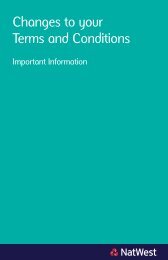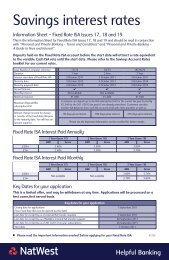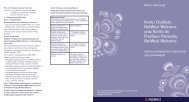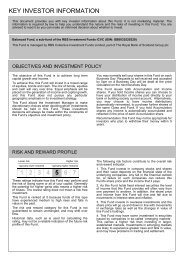[PDF] Our commitment to you - NatWest
[PDF] Our commitment to you - NatWest
[PDF] Our commitment to you - NatWest
- No tags were found...
Create successful ePaper yourself
Turn your PDF publications into a flip-book with our unique Google optimized e-Paper software.
Cheques made out <strong>to</strong> one party can be paid in<strong>to</strong> asingle named or joint account, but a cheque made out<strong>to</strong> joint parties cannot be paid in<strong>to</strong> a sole account.There are some cases in which, for legal reasons, oras a result of circumstances beyond our control, thepayment of a cheque in<strong>to</strong> <strong>you</strong>r account may beprevented or may take longer than the timescalesmentioned above. This may effect the day on whichthe money is added <strong>to</strong> <strong>you</strong>r balance; the day on whichwe will start paying interest on the cheque (or s<strong>to</strong>pcharging overdraft interest if <strong>you</strong>r account isoverdrawn); and/or the day on which <strong>you</strong> will be able<strong>to</strong> withdraw the money if <strong>you</strong>r account is in credit.Consequently, <strong>you</strong> should not rely on the abovetimings and check in branch, online or at a cashmachine <strong>to</strong> ensure funds have cleared <strong>to</strong> <strong>you</strong>r account.When a cheque is returned unpaidSometimes a cheque which has been added <strong>to</strong> thebalance on <strong>you</strong>r account is later returned unpaid.If a Sterling cheque issued by a UK bank is returnedunpaid after it has been paid in<strong>to</strong> <strong>you</strong>r account, wecan deduct the amount of the cheque from <strong>you</strong>rbalance (or add it on<strong>to</strong> <strong>you</strong>r overdraft) at any timebefore the end of the sixth business day after the‘transaction day’ or ‘T’. As explained above, T is theday on which the money is added <strong>to</strong> <strong>you</strong>r balance (ortaken off <strong>you</strong>r overdraft). In other words, <strong>you</strong> will notbe sure that the money is <strong>you</strong>rs until the end of T+6.For example, if the money is added <strong>to</strong> <strong>you</strong>r balance ona Monday (T), the point at which <strong>you</strong> can be sure themoney is <strong>you</strong>rs (the end of T+6) will be the end of theTuesday of the following week (or the end of theWednesday of that week if the Monday is a bankholiday). If, before then, the cheque is returned unpaidwe will deduct the amount of the cheque from <strong>you</strong>rbalance – even if we have already allowed <strong>you</strong> <strong>to</strong>withdraw the money. If this means that an unarrangedoverdraft arises on <strong>you</strong>r account, <strong>you</strong> will have <strong>to</strong>pay interest and fees as explained in the fees leafletPersonal and Private Banking – A Guide <strong>to</strong> Feesand Interest.However, if the cheque is not returned unpaid untilafter the end of T+6, we will not deduct money from<strong>you</strong>r account (or add it on<strong>to</strong> <strong>you</strong>r overdraft) unless:(a) <strong>you</strong> give <strong>you</strong>r consent; or (b) <strong>you</strong> were knowinglyinvolved in a fraud concerning the cheque.As before, longer timescales apply where the cheque isnot in Sterling, or is not issued by a UK bank.7


![[PDF] Our commitment to you - NatWest](https://img.yumpu.com/44266841/7/500x640/pdf-our-commitment-to-you-natwest.jpg)


![[PDF] NatWest Welcome Account](https://img.yumpu.com/50935011/1/124x260/pdf-natwest-welcome-account.jpg?quality=85)
![[PDF] NatWest Welcome Account](https://img.yumpu.com/50820486/1/123x260/pdf-natwest-welcome-account.jpg?quality=85)



![[PDF] Graduate Accounts Application Form - NatWest](https://img.yumpu.com/49773169/1/182x260/pdf-graduate-accounts-application-form-natwest.jpg?quality=85)






